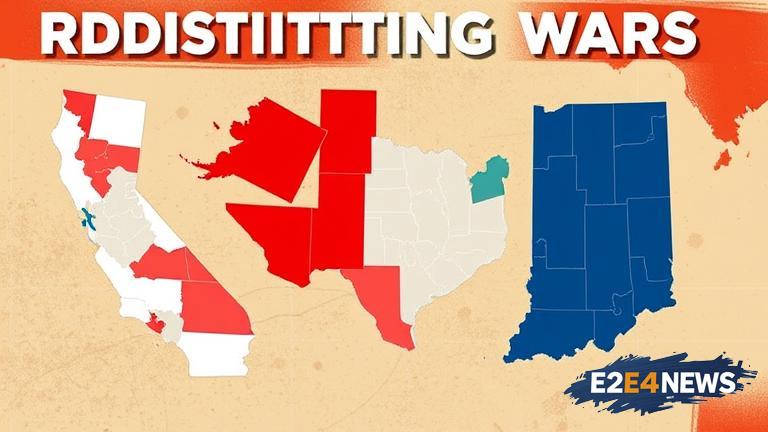The redistricting battles in California, Texas, and Indiana have intensified in recent weeks, with lawmakers, activists, and community groups locked in fierce debates over proposed maps and voting rights. In California, the state’s independent redistricting commission has released its final maps, which have been met with criticism from some lawmakers and community groups. The new maps are expected to significantly alter the state’s congressional and legislative districts, potentially affecting the balance of power in Sacramento and Washington D.C. Meanwhile, in Texas, Republican lawmakers have proposed a new map that would likely give the party an even stronger grip on the state’s congressional delegation. The plan has been met with fierce opposition from Democrats and civil rights groups, who argue that it would dilute the voting power of minority communities. In Indiana, the state’s Republican-controlled legislature has approved a new map that would likely maintain the party’s control over the state’s congressional delegation. However, Democrats and some community groups have criticized the map, arguing that it would unfairly split some communities and limit the voting power of minority groups. The redistricting process has been marked by controversy and litigation in all three states, with lawsuits filed in California and Texas challenging the proposed maps. The battles over redistricting are not just about politics, but also about the fundamental right to vote and have a voice in government. The outcome of these battles will have significant implications for the balance of power in each state, as well as the country as a whole. The redistricting process is a complex and often contentious one, involving the use of sophisticated mapping software and demographic data to draw new district boundaries. In California, the independent redistricting commission has been working to create maps that are fair and representative of the state’s diverse population. However, the process has been marked by controversy, with some lawmakers and community groups arguing that the commission has not done enough to address issues of voting rights and representation. In Texas, the Republican-controlled legislature has been accused of gerrymandering, or manipulating district boundaries for partisan gain. The proposed map has been criticized for splitting minority communities and limiting their voting power. The redistricting battles in Indiana have been marked by similar controversy, with Democrats and some community groups arguing that the proposed map would unfairly split some communities and limit the voting power of minority groups. The outcome of these battles will have significant implications for the balance of power in each state, as well as the country as a whole. The redistricting process is a critical component of American democracy, ensuring that each citizen has an equal voice in government. However, the process is often marked by controversy and litigation, as lawmakers and activists clash over proposed maps and voting rights. In recent years, the Supreme Court has played a significant role in shaping the redistricting process, issuing rulings on issues such as gerrymandering and voting rights. The court’s decisions have had significant implications for the balance of power in each state, as well as the country as a whole. As the redistricting battles in California, Texas, and Indiana continue to unfold, it is clear that the outcome will have significant implications for the future of American democracy. The redistricting process is a complex and often contentious one, involving the use of sophisticated mapping software and demographic data to draw new district boundaries. However, at its core, the process is about ensuring that each citizen has an equal voice in government, and that the fundamental right to vote is protected. The battles over redistricting are not just about politics, but also about the health of American democracy. As the country continues to evolve and grow, it is critical that the redistricting process is fair, transparent, and representative of the diverse population. The outcome of these battles will have significant implications for the balance of power in each state, as well as the country as a whole, and will shape the future of American democracy for years to come.
